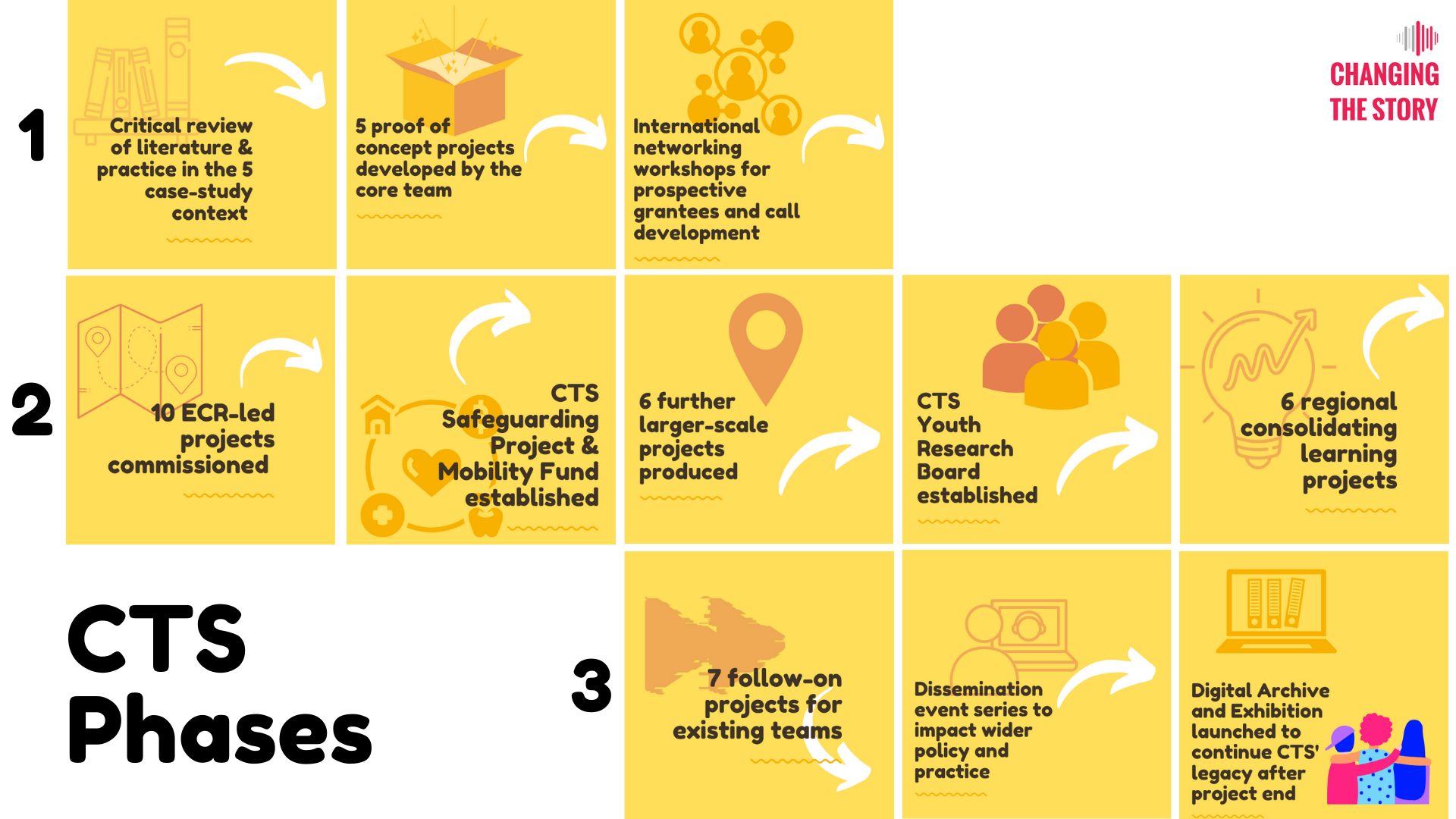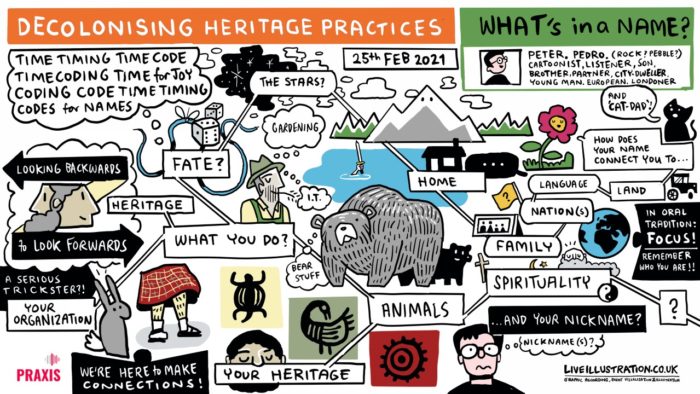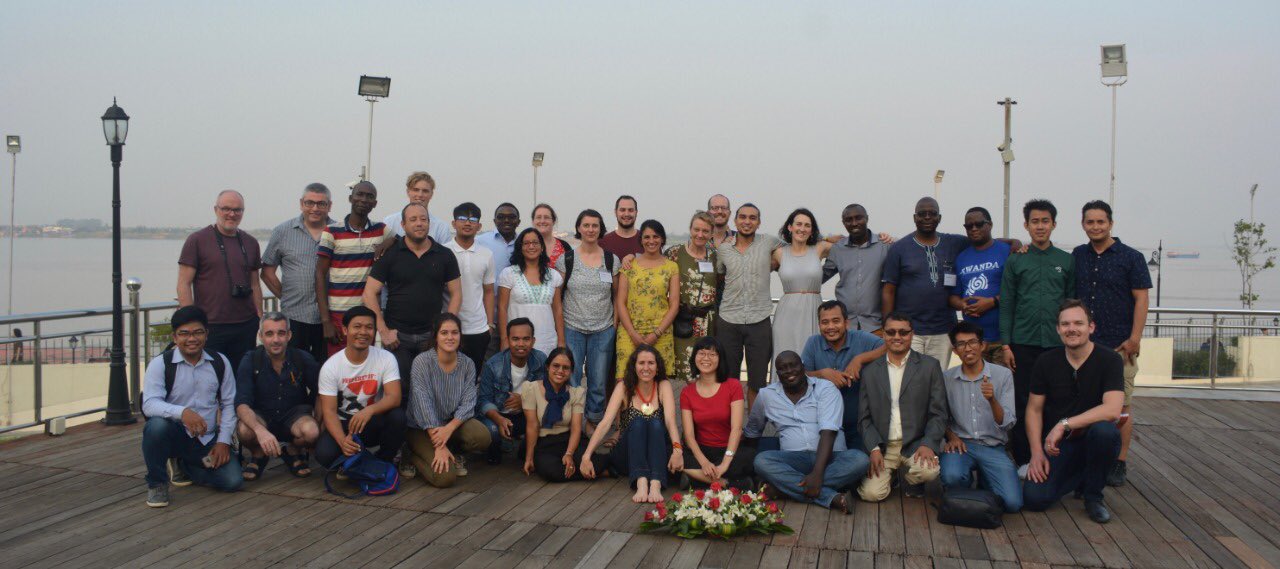About
Changing the Story

PRAXIS: Arts and Humanities for Global Challenges
In 2018, CTS Co-I Prof. Stuart Taberner, with CTS PI Prof. Paul Cooke, successfully applied for additional funding to deliver PRAXIS: Arts and Humanities for Global Challenges. A sister project of CTS, Praxis, led by Taberner, was an ambitious and outwardly collaborative AHRC-GCRF funded project PRAXIS that sought to champion the unique and distinctive contribution that arts and humanities research can make to global development challenges.
Based at the University of Leeds, PRAXIS explored how we collated research findings across the 200 projects that had been awarded funding under the AHRC-GCRF and Newton portfolios thus far, and how we quantified the collective impact of AHRC-GCRF research on global challenges that had since emerged. The project bridged the substantial portfolio of AHRC-GCRF research, bringing together UK and global partners for a series of three-day international workshops (Nexus Events) and smaller one-day learning events around four focal, intersecting themes: heritage (lead: Dr. Francesca Giliberto), conflict and displacement (lead: Dr. Robyn Gill-Leslie), Covid-19 (Dr. Luba Pirgova-Morgan, and Youth Engagement (Dr. Alyson Brody). Activities were coordinated by Project Officer Lauren Wray.
In the wake of Covid, much of PRAXIS' events went online, reaching an even wider audience, and several reports have now been published within each strand, tailored to academics, policy makers and funders at the national and international level. Read the reports and learn more about PRAXIS.

An excerpt of illustrated overviews from a PRAXIS Heritage and Our Sustainable Futures workshop, 2021.
Thank You
Changing the Story and PRAXIS were funded by the Arts and Humanities Research Council's Global Challenges Research Fund (GCRF). Following national cuts to GCRF funding in 2021, we are especially grateful for the additional support from University of Leeds and the Fraxinus Trust that ensured Changing the Story's network's activities could continue and build until the end of our project.
We would like to give a huge thank you to everybody who was a part of Changing the Story and PRAXIS, however briefly, for your input into our learning and direction, and would like to give a special thank you to the young people we worked with across the world who shared their time, energy and knowledge so generously. We wish you all the best for your futures.

Some members of the CTS and PRAXIS networks at a joint Early Career Researcher development workshop in Cambodia, 2019.
CTS Research Overview
The legacy of internal conflict, violence, even genocide poses one of the most intractable obstacles to development in post-conflict states. The ongoing lack of resolution of the past is often a very significant factor in the marked fragility of any development gains in such countries. Our project investigated the efficacy of civil society organisations (CSOs, including museums, heritage organizations, community participatory arts and activist groups) in promoting social reconciliation and respect for equality and human rights in the aftermath of conflict.
The project focused on 12 countries from across the DAC list of ODA recipients and from the OECD list of 'fragile states': Colombia, Cambodia, Rwanda, Kosovo, South Africa, Kenya, Nepal, Bosnia and Herzegovina, Venezuela, Malaysia, India and Zimbabwe. Over the last 40 years, these countries have had to confront the material consequences of their violent pasts. Each has a very different relationship to this past, from Colombia, where the processes of reconciliation are only just beginning, to Cambodia where the violence of the Khmer Rouge has passed into history and yet its memory continues to shape contemporary society.
The international development community and donor states have invested heavily in the work of Civil Society Organisations supporting reconciliation initiatives, particularly focussed on children and young people - a disproportionately large part of the population due to the effects of past violence on their parents' generation. This demographic imbalance is often exacerbated by the long-term impact of a wide range of social issues (e.g. HIV/AIDs in South Africa). Civil Society Organisations are invariably considered 'an essential component of peace-building work' (Zelizer 2003). For example, of the role of community theatre in Rwanda which is often cited in efforts to support transitional justice. Such initiatives are often considered to have immediate, therapeutic impact for participants, allowing participants to create new ‘social imaginaries’ (Dancey 2018). At the same time, such work can also be considered to be counterproductive. Indeed, the very notion of civil society can be contested as a potentially ethnocentric, normative, indeed idealistic, paradigm of democratisation and development (Hann 2003). Its transferability into societies elsewhere cannot be automatically assumed. Indeed its well-intentioned ‘export’, along with the projects that seek to support its development can - however inadvertently - even promote illiberal expressions of civil activism, or help further entrench ethnic or political prejudices (Kostovicova 2006). In post-conflict settings, Civil Society Organisations, often funded by international agencies, can proliferate. However, they can also frequently fail to gain local traction due to their lack of engagement with existing, local, civic capacities and actors.
Given the lack of resources generally available in Civil Society Organisations and the focus of colleagues in international development on the frontline delivery of services to the communities they support, there is only a weak research evidence base for the efficacy of these interventions. Building on our previous Global Challenges Research Fund projects, through this project we delivered the first large-scale comparative study of Civil Society Organisations practice across a range of post-conflict societies, confronting the challenge of building strong institutions for the delivery of social justice for young people.
Adopting quantitative and qualitative, co-production and action-research methodologies, Changing the Story worked in partnership with researchers at Higher Education Institutions and Independent Research Organisations across the UK and ODA-recipient countries, using our research findings to develop new methods, case studies and practical toolkits, for engaging children and young people with the many ways that violent national pasts continue to impact on their communities and countries. In the process we sought to generate new theory, as well as making a significant intervention both on the ground and at policy level.
Working at the intersection between the Art and Humanities and Social Sciences, and crossing a broad range of disciplines (including languages and cultural studies, arts practice, film, history, post-colonial studies, cultural policy, anthropology, social policy, development studies, education and law), this project forged new ways of utilizing Arts and Humanities research for practical international development projects with a lasting legacy. In so doing, we have helped highlight the broad potential of Arts and Humanities within the context of International Development.
